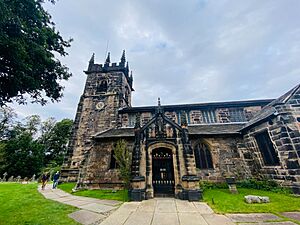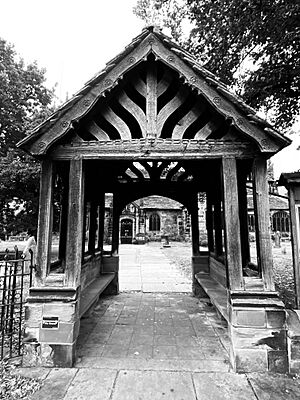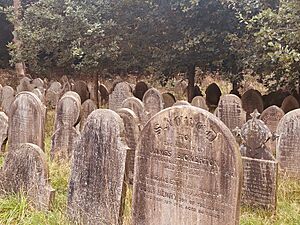St Bartholomew's Church, Wilmslow facts for kids
Quick facts for kids St Bartholomew's Church, Wilmslow |
|
|---|---|

St Bartholomew's Church, Wilmslow, from the south
|
|
| Lua error in Module:Location_map at line 420: attempt to index field 'wikibase' (a nil value). | |
| OS grid reference | SJ 848 814 |
| Location | Wilmslow, Cheshire |
| Country | England |
| Denomination | Anglican |
| History | |
| Status | Parish church |
| Dedication | Saint Bartholomew |
| Consecrated | 16th century |
| Architecture | |
| Functional status | Active |
| Heritage designation | Grade I |
| Designated | 30 March 1951 |
| Architect(s) | Brakspear, J. S. Crowther, Bodley and Garner |
| Architectural type | Church |
| Style | Gothic, Gothic Revival |
| Completed | 1898 |
| Specifications | |
| Materials | Buff sandstone Kerridge stone-slate roof |
| Administration | |
| Parish | Wilmslow |
| Deanery | Knutsford |
| Archdeaconry | Macclesfield |
| Diocese | Chester |
| Province | York |
St Bartholomew's Church is a beautiful old church located in Wilmslow, a town in Cheshire, England. It's a very important building, listed as a Grade I historic site on the National Heritage List for England. This means it's one of the most special buildings in the country! It's still an active Anglican church, serving the local community as a parish church. It belongs to the diocese of Chester.
Contents
History of St Bartholomew's Church
The first mention of a church on this spot was in 1246. None of that original church remains today. However, there is a secret crypt (an underground room) that is even older than the current church building. Most of the church you see now was built in the early 1500s. The bottom part of the church tower might be even older, possibly from the 1400s.
In 1700, the Hawthorne Chapel was added to the church's south side. It replaced an older chapel from 1520. The church has been updated several times over the years. In 1862-63, Brakspear did some restoration work. Later, in 1878, J. S. Crowther added a vestry (a room for clergy) and a south porch. In 1898, Bodley and Garner added a clerestory (a row of windows high up) to the chancel.
Church records, called parish registers, started in 1558. The accounts from the churchwardens (people who look after the church) go back to 1585.
Architecture and Design
Outside the Church
The church is built from buff sandstone, which is a light brown stone. The roof is made of Kerridge stone-slate. At the west end of the church, there's a tall tower. This tower leads into the main part of the church, called the nave, which has five sections or "bays." On either side of the nave are north and south aisles (passageways).
Beyond the nave is the chancel, where the altar is. There are also chapels on the north and south sides of the chancel. A vestry is located north of the north chapel. You can enter the church through a south porch, and the Hawthorne Chapel sticks out from the south wall.
Inside the Church
Inside the north aisle, you can find an old aumbry (a small cupboard in the wall, often used to store sacred items). The chapel at the east end of the north aisle is called the Trafford Chapel. The chapel at the east end of the south aisle is known as the Booth or Prescott Chapel. In the Booth Chapel, there is a large tomb for Captain John Worrall. The Hawthorne Chapel has some old wooden panels and seating from the early 1700s.
In the chancel, there's a crypt chapel that dates back to around 1300. You can reach it by a spiral staircase. It has a triple sedilia (seats for the clergy). On the chancel floor, you'll see the oldest brass (a metal plaque) in Cheshire, from 1460. It remembers Sir Robert del Booth and his wife, Douce. The chancel also holds the tomb of Henry Trafford, who was the rector (head priest) of Wilmslow starting in 1522. His effigy (a statue of him) is dressed in church robes. In the north wall of the chancel, there are two spaces with red sandstone statues.
Only small pieces of the original stained glass windows remain. However, three beautiful windows from 1920 were designed by Dearle and made by Morris and Company.
The church has a large organ with two manuals (keyboards). It was first built in 1866 by Wadsworth. It was rebuilt in 1897 by Alexander Young and again in 1961 by Smethurst. In late 2017, the organ had a big restoration after £250,000 was raised to save it. It was upgraded to have three manuals and 42 "speaking stops," which are different sounds the organ can make.
The church also has a set of six bells. These bells were made in 1733 by Abraham Rudhall II.
Churchyard Features
In the churchyard, you can find an old medieval font (a basin for baptism) made of buff sandstone. There's also a sundial from the late 1600s. The lych gate (a covered gateway to the churchyard) was built in 1904. It has an open wooden frame on a stone base and a stone-slate roof. There are stone seats on each side. These structures are all listed as Grade II historic buildings.
One of the oldest gravestones in Cheshire, dated 1596, is also in this churchyard. The churchyard is also the resting place for eight soldiers and one Royal Navy sailor who died in World War I.
See also
- Grade I listed buildings in Cheshire East
- Grade I listed churches in Cheshire
- Listed buildings in Wilmslow
- List of works by J. S. Crowther
 | Misty Copeland |
 | Raven Wilkinson |
 | Debra Austin |
 | Aesha Ash |



